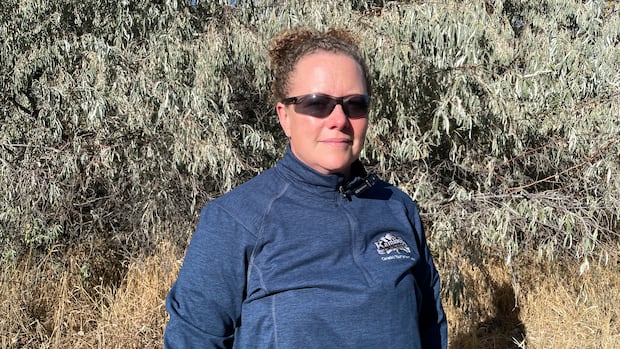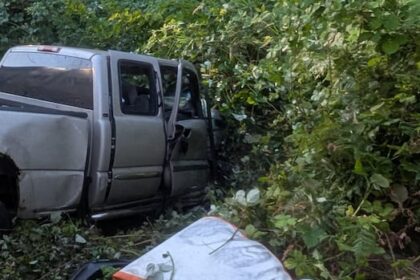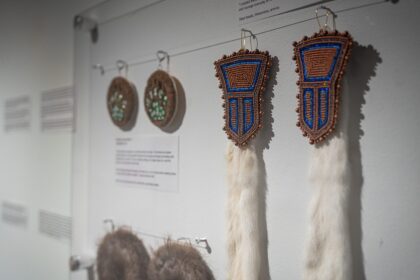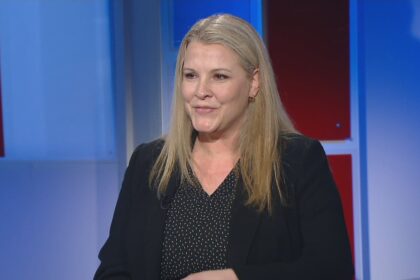British ColumbiaRussian olive trees may be pretty, but they’re also a problem. In Kamloops, the city is taking an innovative approach to getting rid of them, by introducing a kind of mites. City harnessing the power of mites to manage plant species spread CBC News · Posted: Nov 01, 2025 9:00 AM EDT | Last Updated: 6 hours agoListen to this articleEstimated 4 minutesThe Russian olive is an invasive species in B.C. (Jenifer Norwell/CBC)Russian olive trees — sometimes known as silver berry or oleaster — are small, ornamental plants with silvery leaves and black bark, and small yellow flowers and silver fruit that look like miniature olives. They’re pretty, but they’re a problem. The species is invasive in B.C., having been brought to the province from its native range in Russia and other parts of Asia, according to the Invasive Species Council of B.C. And that’s why some communities, like Kamloops, are looking to get rid of them. Russian olive is a hardy plant that can survive in dry conditions and cold temperatures, making it perfect for a climate like that of Kamloops, a semi-arid, desert-like city in B.C.’s Interior. They take in more water than most plants in areas where the soil is dry, which means they can outgrow native plants, the invasive species council says. “Whenever you have a non-native species, there’s some that are fairly assertive, aggressive and those are the ones that we are concerned about,” council executive director Gail Wallin said. WATCH | City of Kamloops working to get rid of Russian olive trees:Kamloops trying to best Russian Olives with bio controlThe Russian olive gall mite has been released in the Kamloops area and the city is working with the Canadian Food Inspection Agency to see if it will reduce the spread of the invasive Russian olive. She said Russian olive are “huge competitors” for water. “In a time when we’re really concerned about water and water availability for our native species and for habitats, that’s a real concern.”But getting rid of them isn’t so easy. Because they have a strong root system and will grow back if every bit of plant isn’t removed, extra care has to be taken, according to Wallin. In Kamloops, the city is taking a different approach. Instead of pulling up trees and risking not getting the roots, or spraying them with pesticides that could be harmful to the ecosystem, the city is using biological controls — bugs. Aceria angustifoliae are small mites found in Europe and Asia, according to Kirsten Wourms, the crew leader of natural resources for the City of Kamloops. She said the mites affect the flowers, the fruits and new young shoots of the trees so that they cannot reproduce.“Over time, we’re actually looking at the Russian olive population decreasing,” Wourms said.But, she said, the process could take anywhere from 20 to 50 years. Kirsten Wourms, crew leader for natural resources with the City of Kamloops, said it could take decades for the Russian olive tree populations to decrease — but using biological controls is less harmful to other species, she added. (Jenifer Norwell/CBC)Moving slow isn’t all bad, though. Wourms said it will give birds, insects and other animals that have come to rely on Russian olive trees time to adjust and find alternate food or shelter.“One of the biggest lovers of Russian olive are the bears,” Wourms said. “They come in and eat the fruit in the fall, help to fatten them up. So many pollinators use them.”The project is in conjunction with the Canadian Food Inspection Agency (CFIA), Wourms said, which has tested the mites to make sure they won’t harm other species in the area.Education programThe Invasive Species Council of B.C. is always working to educate British Columbians about plants, insects and animals that are harming native species.Wallin said they’ve been working with local retailers to get them to stop selling invasive plants, and some local governments ban certain species, although Russian olive has not yet been banned by most municipalities, she added. The council runs a program called PlantWise that aims to make B.C. invasive species-free. They encourage people to learn about the plants in their yards and communities, and to get rid of any invasive ones responsibly. “We can all make a big difference,” Wallin said. With files from Jenifer Norwell
Kamloops working to remove invasive Russian olive trees but it could take decades











